Comparing Interlocking vs Concrete for Your Toronto Driveway
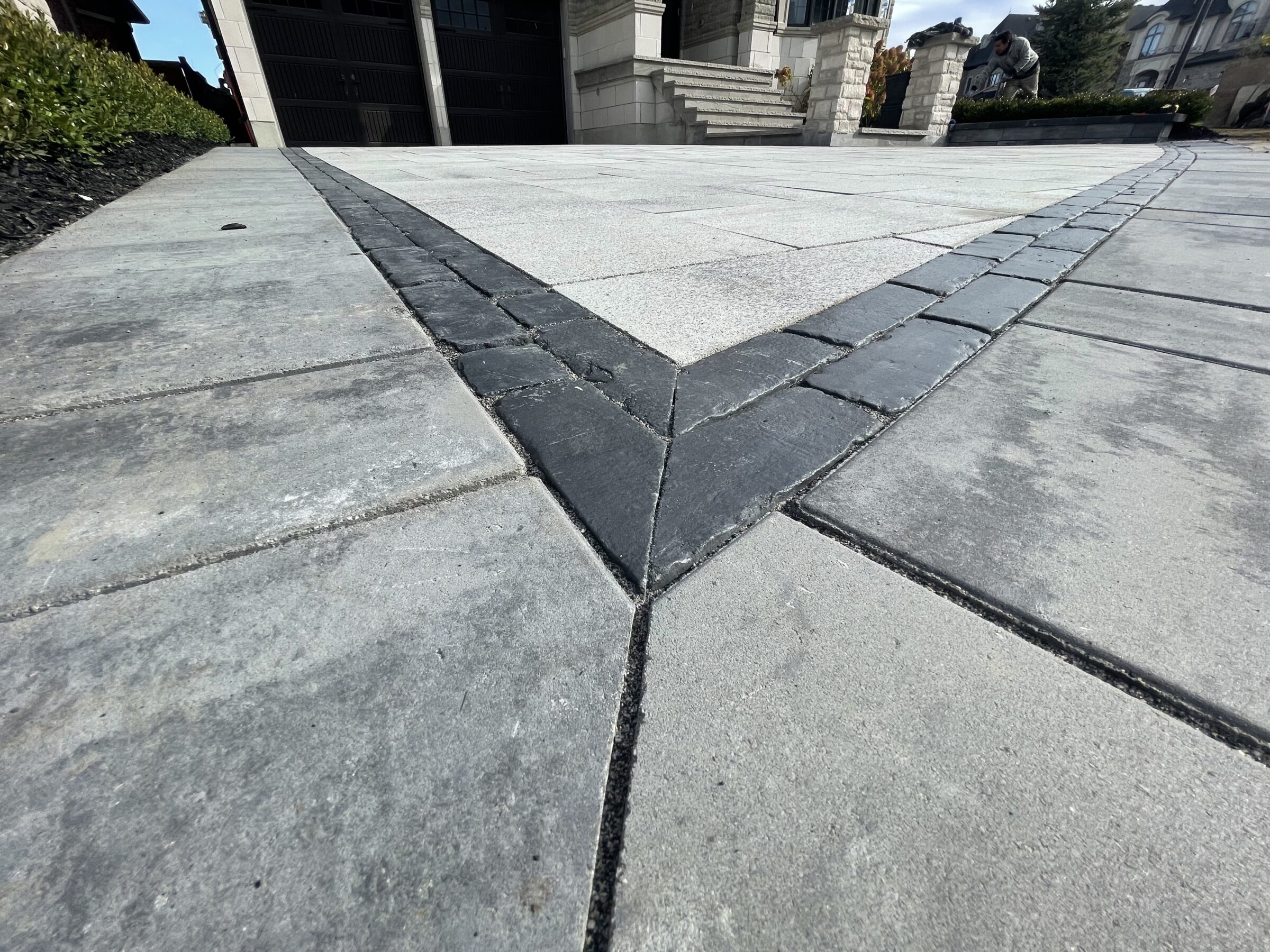
You pull into your driveway and wince. That cracked patch near the garage has gotten wider, and he concrete is starting to heave or sink in places. Or maybe you’re swerving around a crater-sized pothole like it’s rush hour on Queen Street. Either way, your driveway isn’t just showing its age, it’s broadcasting it.
The entrance to your home is important, it frames the entire first impression of your property and sets the tone for what’s inside. It’s the first thing your neighbours notice, the first feature your guests take in, and a subtle cue to future potential buyers determining the value of your home. A battered and broken driveway can overshadow all of the upgrades and hard work you’ve invested into your home’s appearance, and knock thousands off its perceived worth.
Before you start tearing it up, it’s worth understanding what you’re choosing to put down in its place. Not all driveway materials are created equal, and the decision between interlocking pavers and poured concrete will influence more than just curb appeal. It’s a long-term investment in how well your property stands up to daily use, responds to Toronto’s extreme seasons, and contributes to your home’s long-term value.
Understanding the Differences Between Interlock and Concrete Driveways
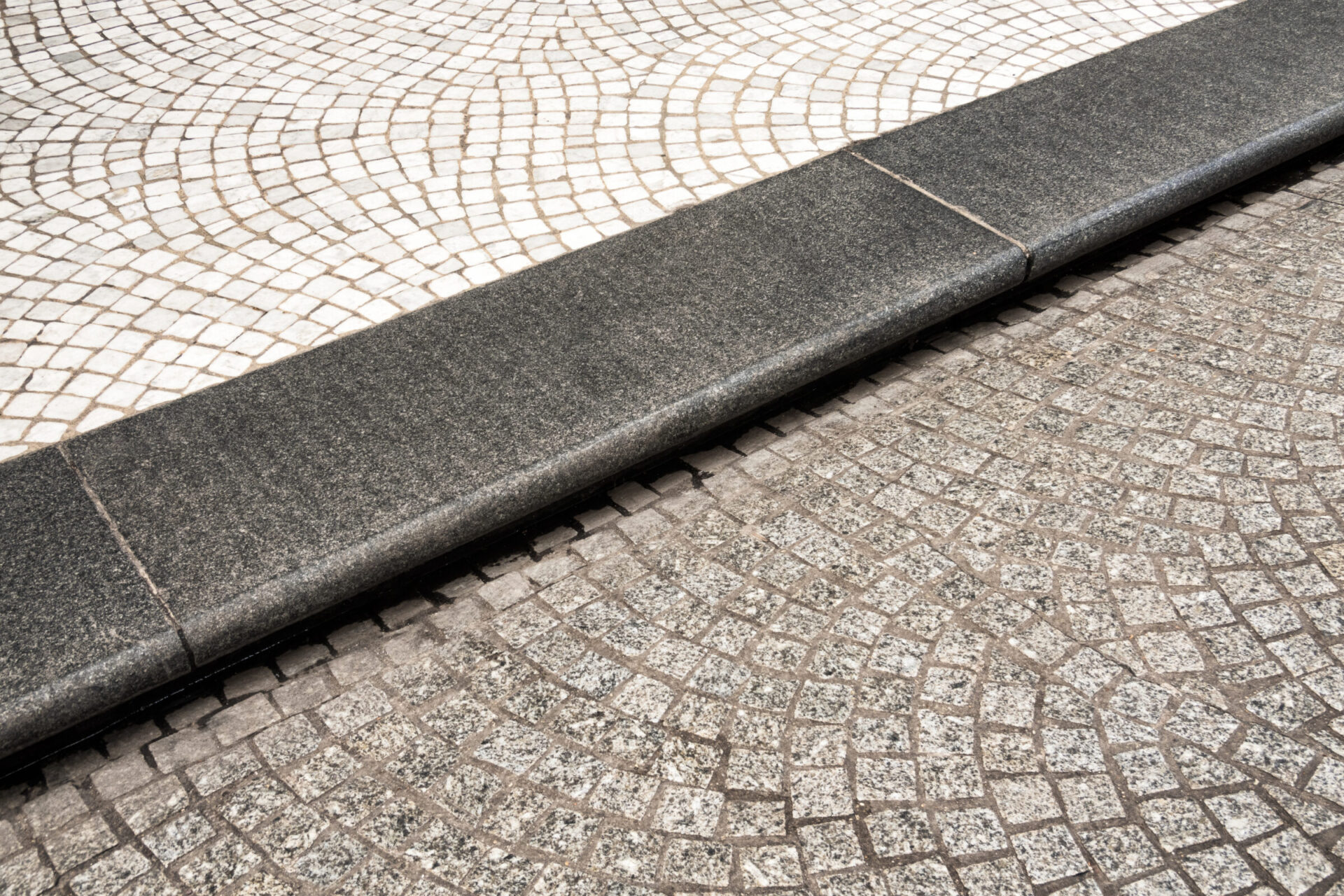
Different driveway materials come with different expectations: how they look, how long they last, and how well they deal with everything Toronto’s weather throws at them.
The right material should match how your driveway is used and consistently perform through Toronto’s weather, from salt and runoff to the temperature swings that wear surfaces down over time.
Concrete driveways are typically poured in large slabs and offer a clean, minimal appearance. While they’re often viewed as budget-friendly and quick to install, they’re prone to cracking, shifting, and discoloration over time, especially in climates like Toronto’s where freeze-thaw cycles take a heavy toll.
Interlocking paver driveways, on the other hand, are made from precision-cast concrete blocks arranged in a custom pattern. This modular system provides more flexibility under pressure. If one section shifts or cracks, it can be lifted and repaired without tearing out the whole surface. With dozens of patterns, finishes, and colour blends to choose from, interlock gives you the design freedom to complement any home style, from modern to traditional.
Both materials can boost curb appeal and improve resale value, but the experience over time differs. Concrete may need sealing, resurfacing, or full replacement as it ages. Interlock may require occasional joint sand refilling and leveling, but offers more flexibility and fewer major repairs long term.
You also don’t need to wait for major damage before making the switch. Replacing a tired or uneven surface is one of the most effective ways to improve both the day-to-day use of your driveway and the perception of your home’s value on the market.
What Makes Concrete Driveways a Smart Choice in Toronto
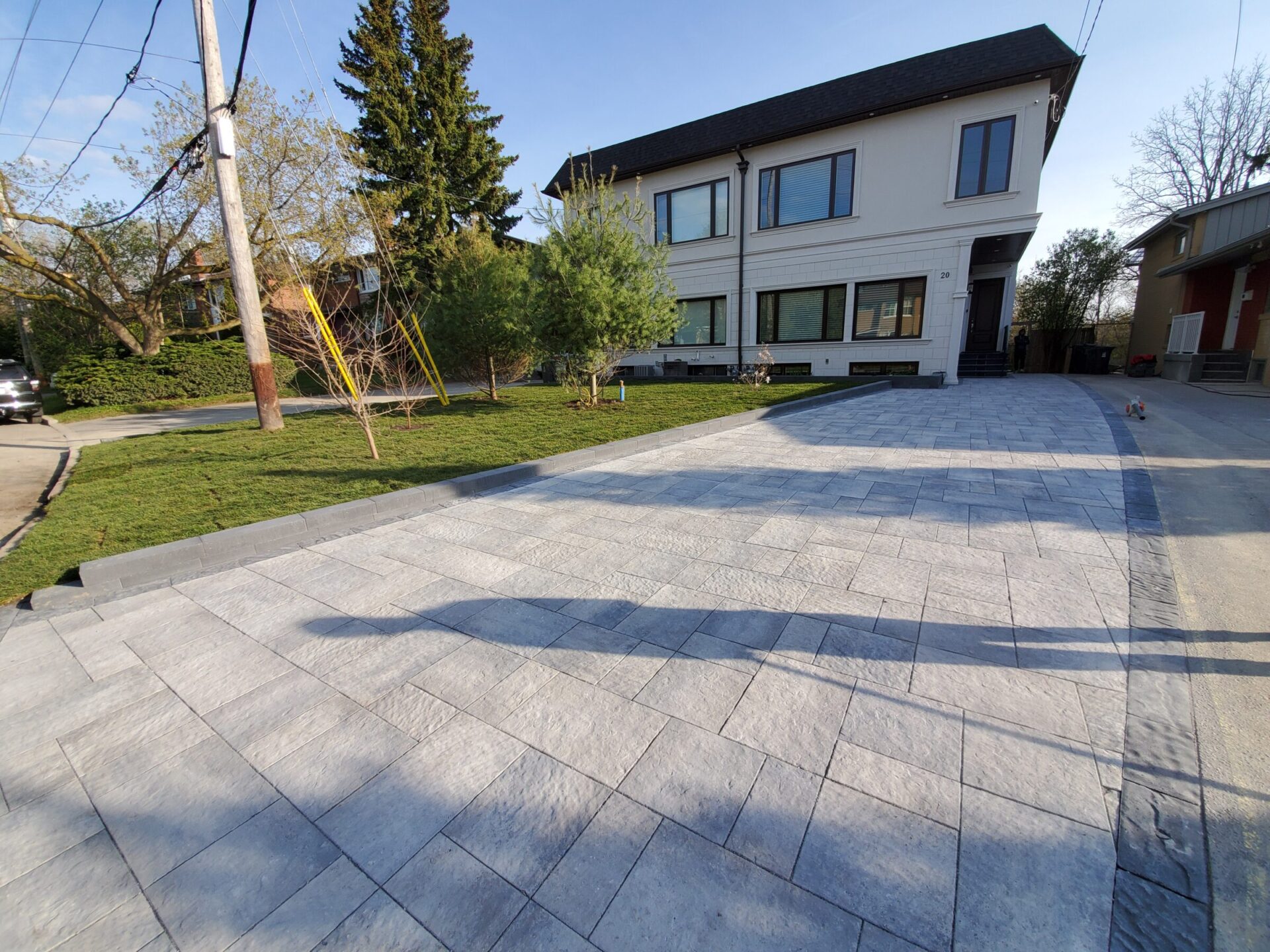
A concrete driveway doesn’t just offer a clean, modern look — it’s often chosen for its simplicity, affordability, and straightforward installation process. Whether it’s smooth grey slabs that pair well with contemporary architecture or a broom-finished surface that adds traction during icy months, concrete provides a practical, low-maintenance solution for many Toronto homeowners.
While concrete lacks the natural variation of stone or pavers, it still delivers a uniform, streamlined aesthetic that works well with many home styles. Over time, it can develop minor cracks or discolouration, but with regular sealing and care, it maintains a tidy appearance that doesn’t easily date.
A properly installed concrete driveway is engineered to handle Toronto’s weather fluctuations — from snow buildup and ice to spring runoff and salt exposure. With a stable gravel base and appropriate expansion joints, concrete can last 20 to 30 years or more, though homeowners should be prepared for periodic maintenance like sealing or resurfacing.
The long-term impact is moderate but reliable. Many buyers appreciate a freshly poured concrete driveway that’s structurally sound and ready to use. In neighbourhoods where curb appeal matters, a clean and crack-free driveway can make a strong first impression without requiring a premium price tag.
The cost is one of concrete’s biggest advantages. Compared to premium materials like interlock or stone, concrete is more affordable in both materials and labour. For homeowners looking to balance aesthetics, durability, and budget, concrete offers a smart, functional solution with a solid return on investment.
How to Get the Most Out of Your Interlock Driveway in Toronto
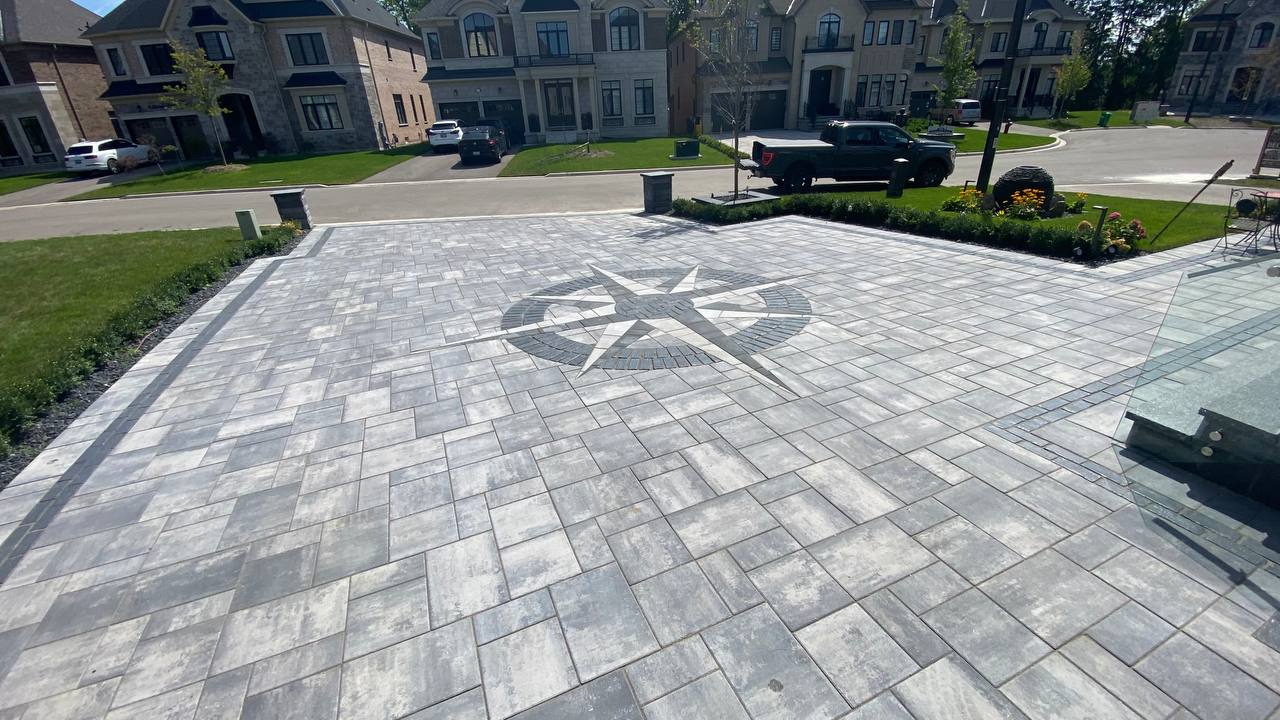
Interlock pavers have come a long way from the standard red brick patterns you might remember from older homes. Today’s options include clean-lined rectangular formats, textured finishes that mimic cobblestone, and colour palettes ranging from modern neutrals to warm, rustic tones. You can add a border in a contrasting colour, build in gentle curves, or create a multi-tone pattern that mirrors your home’s architectural details.
One of the biggest advantages of interlock driveway installation in Toronto is efficiency. These concrete pavers are manufactured to tight specifications, so they fit together predictably. For experienced installers, this allows faster progress on site, fewer adjustments during layout, and lower labour costs overall compared to custom stonework.
Interlock performs well in Toronto’s climate when installed correctly. A typical interlock driveway lasts between 20 and 25 years with routine maintenance. And if a section needs repair—whether due to shifting, tree roots, or underground utility work—you can lift and reset only the affected pavers. That kind of targeted fix simply isn’t possible with poured surfaces or concrete slabs.
The design of interlock systems also supports weather resilience. The small joints between pavers help absorb movement during temperature swings and allow water to pass through. That reduces the risk of surface cracking, ice build-up, or standing water after heavy rain.
Aesthetically, interlock offers a clean, structured look, but it may not deliver the same sense of natural variation and texture as genuine stone. It also requires more frequent maintenance to keep that sharp appearance intact. Joint sand will need to be refreshed from time to time, surface cleaning becomes part of the routine, and you may need to stay ahead of weed growth between the pavers to keep everything looking well-kept.
Making the Right Choice for Your Toronto Property
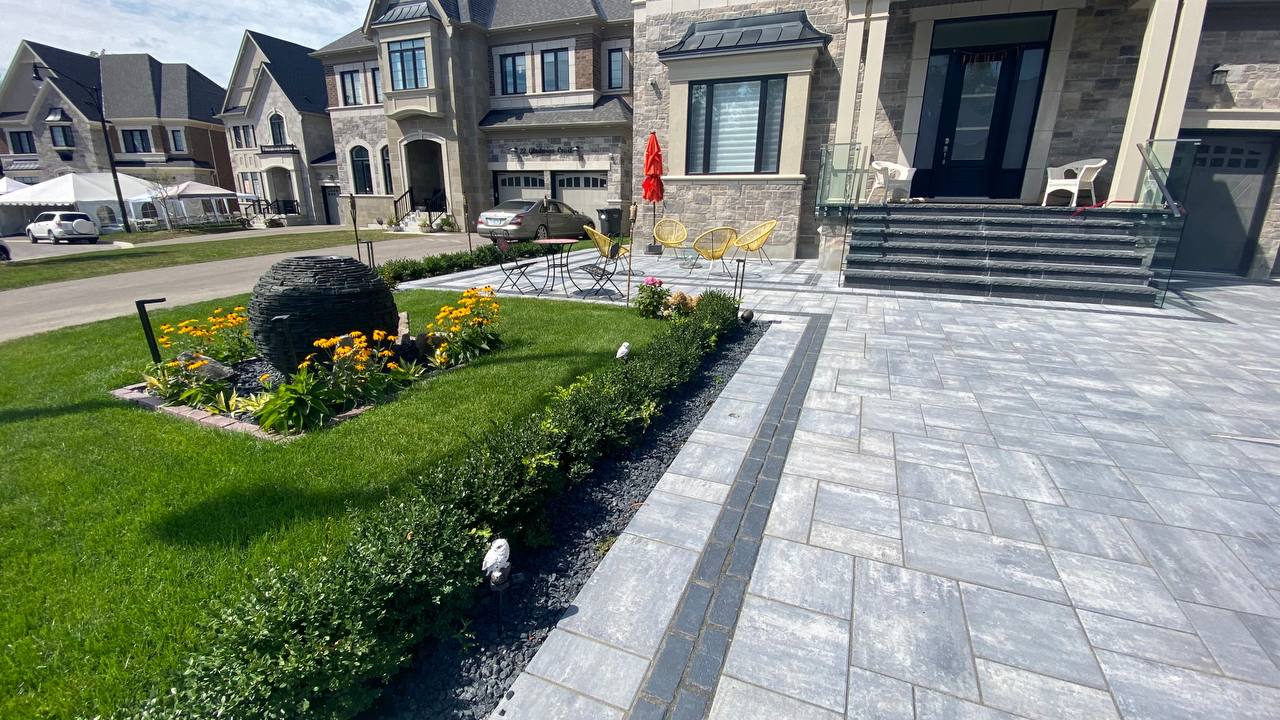
When you’re choosing between interlock and concrete, the right answer depends on more than just looks. The material you pick should align with your goals for the space, how long you plan to stay in the home, and what kind of upkeep you’re prepared to manage.
What to Consider When Budgeting for Your New Driveway
Budget planning goes beyond the sticker price. While a concrete driveway typically costs less up front — often 30 to 50 percent less than interlock — the numbers only tell part of the story. The lower cost reflects the simplicity of materials, faster installation time, and less specialized labour required.
Over time, those savings can shift. Concrete may need sealing every few years, and it’s more prone to cracking due to freeze-thaw cycles. Repairs can be more intensive, sometimes requiring full slab replacement. Interlock driveways involve some ongoing upkeep, including joint sand replacement, surface cleaning, and keeping weeds from settling between pavers, but individual pavers can be lifted and reset without affecting the whole surface.
Your timeline matters, too. If you plan to sell within the next 5 to 10 years, both materials can add curb appeal and value, but interlock tends to leave a more upscale impression on buyers. If you’re staying long term, interlock may offer better flexibility and easier repair over time, while concrete offers a more cost-effective, lower-effort option for the short to medium term.
How to Match Your Driveway Material to the Style of Your Home
Your driveway should look like it belongs with the rest of your home—not like it was added as an afterthought. For Toronto’s older brick and stone houses, concrete driveways offer a simple visual match. They complement traditional façades and add a sense of history and permanence to the property.
Interlock, on the other hand, is a strong fit for contemporary homes. Its precise lines and customizable patterns make it easy to coordinate with modern landscaping and hardscape features. But even in more traditional settings, interlock can work well when installed with care and attention to detail.
Think about what’s already in your outdoor space. If your garden beds, steps, or retaining walls use concrete, continuing that material into the driveway adds visual consistency. If your landscaping leans toward symmetry and structure, an interlock driveway might be the more seamless fit.
How Toronto Weather Impacts Driveway Installation and Performance
Toronto weather puts driveway materials to the test. Summer heat pushes into the thirties, while winter can bring long stretches of deep freeze. That constant swing in temperature can quickly wear down anything that isn’t built with care.
Both concrete and interlock driveway surfaces can handle the city’s conditions well, but only when installation is done correctly. A reliable contractor will excavate deep enough, use proper base materials, and design a drainage plan that suits your lot. Without that foundation, even the best materials can fail early.
Drainage is especially important. Between spring snowmelt and sudden summer downpours, a poorly graded driveway can lead to water pooling near your foundation or freezing over in low spots. That’s why professional-grade driveway installation in Toronto should always include a clear strategy for runoff and slope.
Comparing the Environmental Impact of Concrete vs. Interlock Driveways in Toronto
If sustainability plays a role in your decision, both options bring advantages worth factoring in. Some interlock driveway systems are designed to be permeable, allowing water to filter through the joints instead of running off. This reduces pressure on Toronto’s stormwater infrastructure and helps replenish groundwater.
Concrete supports sustainability in its own way. Its long lifespan — often 20 to 30 years with proper maintenance — means fewer full replacements, which helps reduce material consumption over time. Choosing locally sourced concrete mixes can also help lower transportation emissions while supporting regional suppliers. Although it’s not as permeable as some other materials, concrete can be installed with proper grading and drainage to help manage runoff responsibly.
Both concrete and interlock outperform traditional asphalt in terms of environmental impact. Asphalt depends on petroleum products, requires regular resurfacing, and has a shorter overall lifespan, making it the least sustainable choice in the long run.
Creating a Driveway That Works for Your Home and Your Future
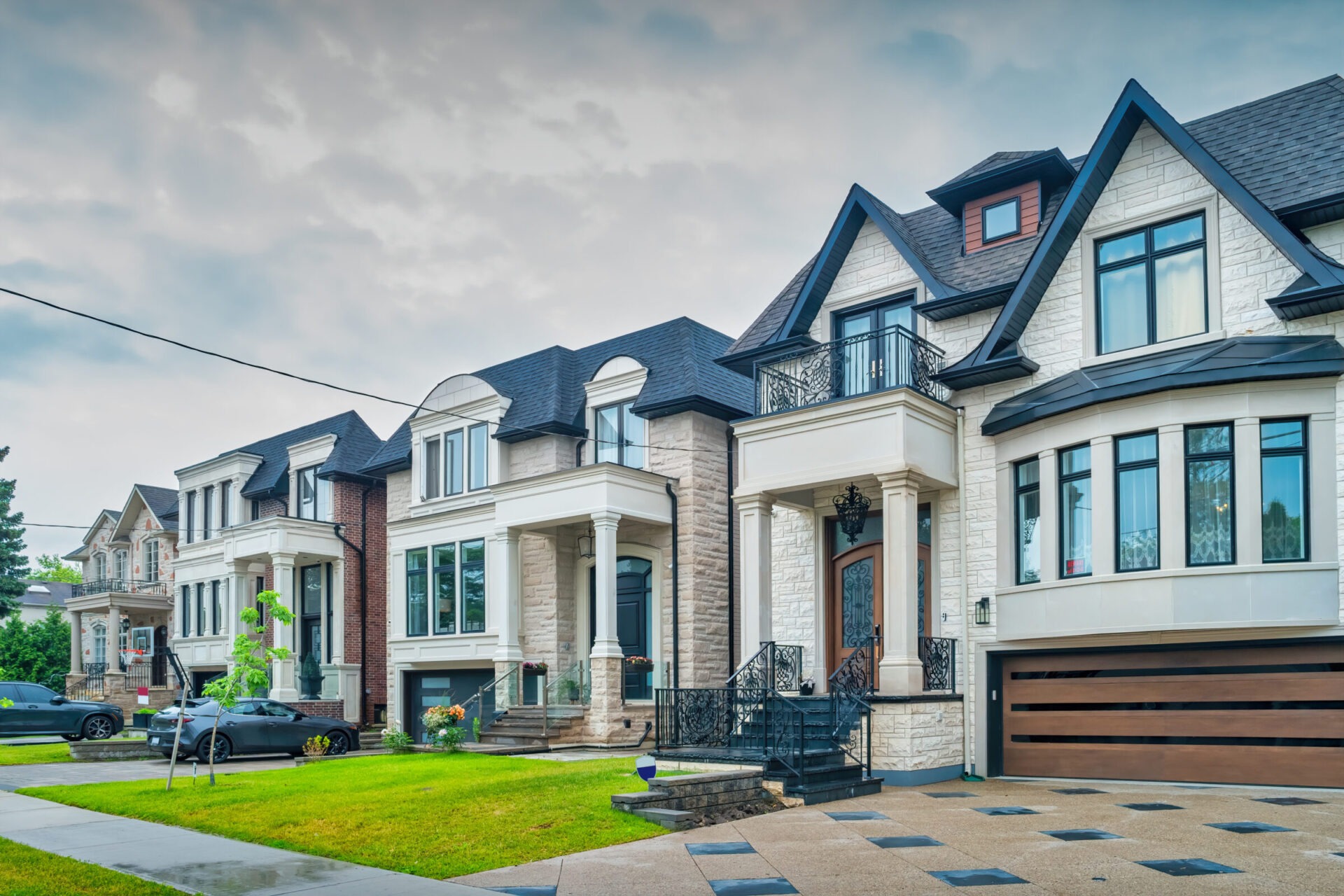
Before choosing a material, look at driveways in your area that have been in place for a few years. That’s where you’ll see how concrete and interlock actually age in Toronto’s conditions.
Concrete offers long-term durability and lasting long-term value with minimal upkeep. Interlock provides more design control and easier repairs if changes are needed down the line.
Whichever you choose, the result depends on the installation. Ask contractors about their base prep, drainage plan, and past work. A properly built driveway adds value, stays strong through every season, and saves you from thinking about repairs for the next two decades.
If you’re planning a driveway renovation, this Comprehensive Guide to Landscape Design and Build Services in the Greater Toronto Area takes you beyond the surface. It covers how proper excavation, base prep, water drainage, and project timing all influence whether your new driveway lasts or fails early. It’s essential reading if you’re aiming to get this right the first time.
You’ve just learned what it takes to choose the right driveway material, avoid costly mistakes, and plan for Toronto’s unpredictable climate. But if you’d rather not take it on alone, Alterra Landscaping is here to help. Our team approaches every driveway like it’s the front cover of your home, with care, expertise, and attention to detail that lasts. Request an estimate and get the kind of project you’ll be proud to come home to.
Tags: